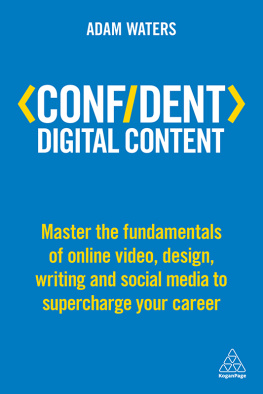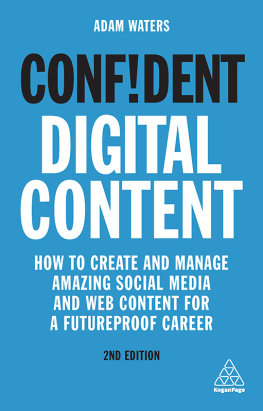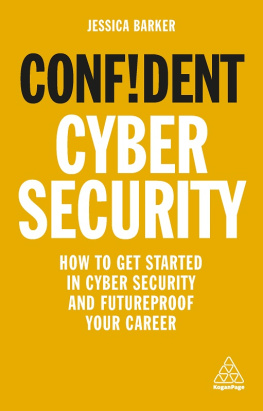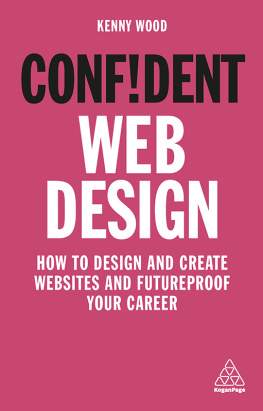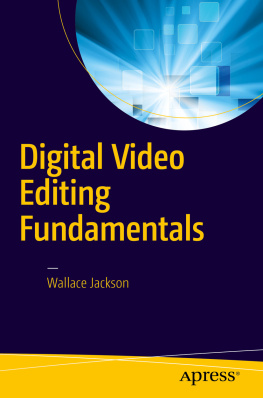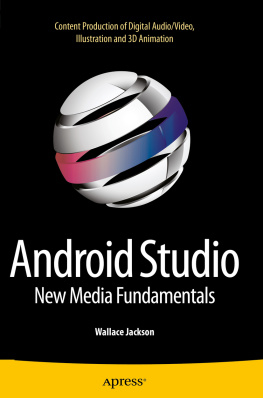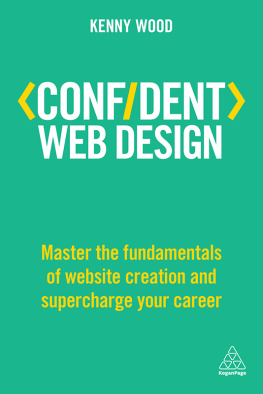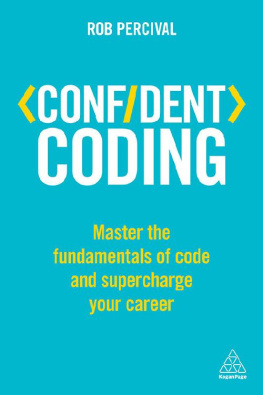Confident Digital Content
Confident Digital Content
Master the fundamentals of online video, design, writing and social media to supercharge your career
Adam Waters

Publishers note
Every possible effort has been made to ensure that the information contained in this book is accurate at the time of going to press, and the publishers and authors cannot accept responsibility for any errors or omissions, however caused. No responsibility for loss or damage occasioned to any person acting, or refraining from action, as a result of the material in this publication can be accepted by the editor, the publisher or the author.
First published in Great Britain and the United States in 2018 by Kogan Page Limited
Apart from any fair dealing for the purposes of research or private study, or criticism or review, as permitted under the Copyright, Designs and Patents Act 1988, this publication may only be reproduced, stored or transmitted, in any form or by any means, with the prior permission in writing of the publishers, or in the case of reprographic reproduction in accordance with the terms and licences issued by the CLA. Enquiries concerning reproduction outside these terms should be sent to the publishers at the undermentioned addresses:
2nd Floor, 45 Gee Street
London
EC1V 3RS
United Kingdom
c/o Martin P Hill Consulting
122 W 27th St, 10th Floor
New York NY 10001
USA
4737/23 Ansari Road
Daryaganj
New Delhi 110002
India
Adam Waters 2018
The right of Adam Waters to be identified as the author of this work has been asserted by him in accordance with the Copyright, Designs and Patents Act 1988.
ISBN 978 0 7494 8094 3
E-ISBN 978 0 7494 8095 0
Typeset by Integra Software Services, Pondicherry
Print production managed by Jellyfish
Printed and bound in Great Britain by CPI Group (UK) Ltd, Croydon CR0 4YY
For Isla
By the time youre old enough to read this the world will be very different.
CONTENTS
List of Figures
List of Tables
Firstly, a huge number of people helped me with this book and Im grateful to all of them my editor Anna Moss for answering all my daft questions, Meri Pentikinen for introducing me to her, and to all my case studies who provide so much expertise and advice from so many different backgrounds.
Ive been lucky in my life to have people who have given me a shot, believed in me and helped me grow as a person. So thank you to my mentors Jedge Pilbrow, John Davies, Steve Clark, John Holliday, Nicky Ness and Nick Pollard. Matt Muir, Jonathan Harper, Paul Vaughan and Luisa Bockmeulen all helped me find interesting people to speak to for this book. Richard Hutchinson gave me so much help with the radio section and Im so thankful. Hes someone who has dedicated much of his life to serving those who serve. Neil Hall helped with much valuable advice on photography thank you, Shippers.
If Ive forgotten to put your name down here, I really am sorry, but I suppose its in print now so Im stuck with the awkwardness.
Finally, thanks to my wife Anna and daughter Isla who are the lights of my life.
A career in digital content means youll get the opportunity to be creative, tell incredible stories and learn new things every day. Its fast moving, so you can always discover something new. You can communicate in lots of different ways a video, an article or an animation. You can connect with people and champion the causes or organizations you feel passionate about.
The best part of it is that anyone can do this. You dont need specific qualifications, expensive equipment or exclusive contacts. All thats required is a desire to learn, creativity and a passion for telling stories.
Digital is a word that can mean many different things to different people. Organizations often use it to refer to technology such as cloud computing or app development. Digital media can mean streaming services like Netflix or computer storage. It can be confusing.
When it comes to digital content, I think of it as written, photographic, audio, designed or video content consumed mainly on a smartphone but possibly on a large-screen computer like a laptop. Thinking of it this way keeps things simple and clear. Social media has become an essential platform to share content on, but it could also be viewed through an app or mobile website, or shared through a messaging tool.
Because of the rapid and far-reaching rise of digital there is as a result an enormous demand for people with digital content skills. The demand is also across virtually all industries and types of organization. This is very good news for someone who is interested in a career in digital content. Some people still have a hard time believing that producing digital content or understanding social media can be a proper job, but by building up your digital content skills you will hopefully find a lot of opportunities.
Its a competitive marketplace too, but for me, the best thing about specializing in digital content is the range of industries you can work in. If you are passionate about cooking you could work for a food brand, creating recipe videos and writing about baking techniques. If you are an outdoorsy person you could work at a national park, promoting the incredible views through an Instagram channel.
You may want to do something more serious, such as journalism, or even work in law enforcement helping promote the work a police force does. This list could go on and on, but hopefully you see that by specializing in digital content you not only get to be creative and have fun but potentially have a career that matches your personal interests too.
It was just before the turn of the millennium that internet use became widespread, though still accessed almost entirely by desktop computers. With its rise, publishers (newspapers, TV stations, PR firms, anyone communicating with the public) quickly moved on to this exciting new platform, building websites to share the content they produced. Newspapers would create electronic versions of their daily papers, media companies would upload video clips to their sites, and radio stations streamed their shows. Still though, this early digital content would often just be the same as its real-world counterpart.
There were two major innovations that did the most to shape our modern digital world and its content: the rise of social media and the launch of the iPhone. The iPhone transformed the communications industry and kick-started the use of smartphones as we know it. Its ease of use made the internet accessible to everyone with a device they carried around with them. Quickly Apples rivals moved to create equally impressive gadgets with powerful cameras and bigger screens. Social media allowed people to instantly and easily share updates, videos or images with a huge network of people. They could easily comment on stories and interact with public organizations.
Combining these two innovations the smartphone with social networks was revolutionary. People could broadcast to the world from wherever they were. The cameras on their phones were more powerful than kit that would cost vast sums of money only 10 years earlier. Smartphones would gradually begin to catch up on desktop computers as the main device people use to access the internet. You only need to look around the next time youre on a busy train for proof that more people stare at their phones than stare at a newspaper.

